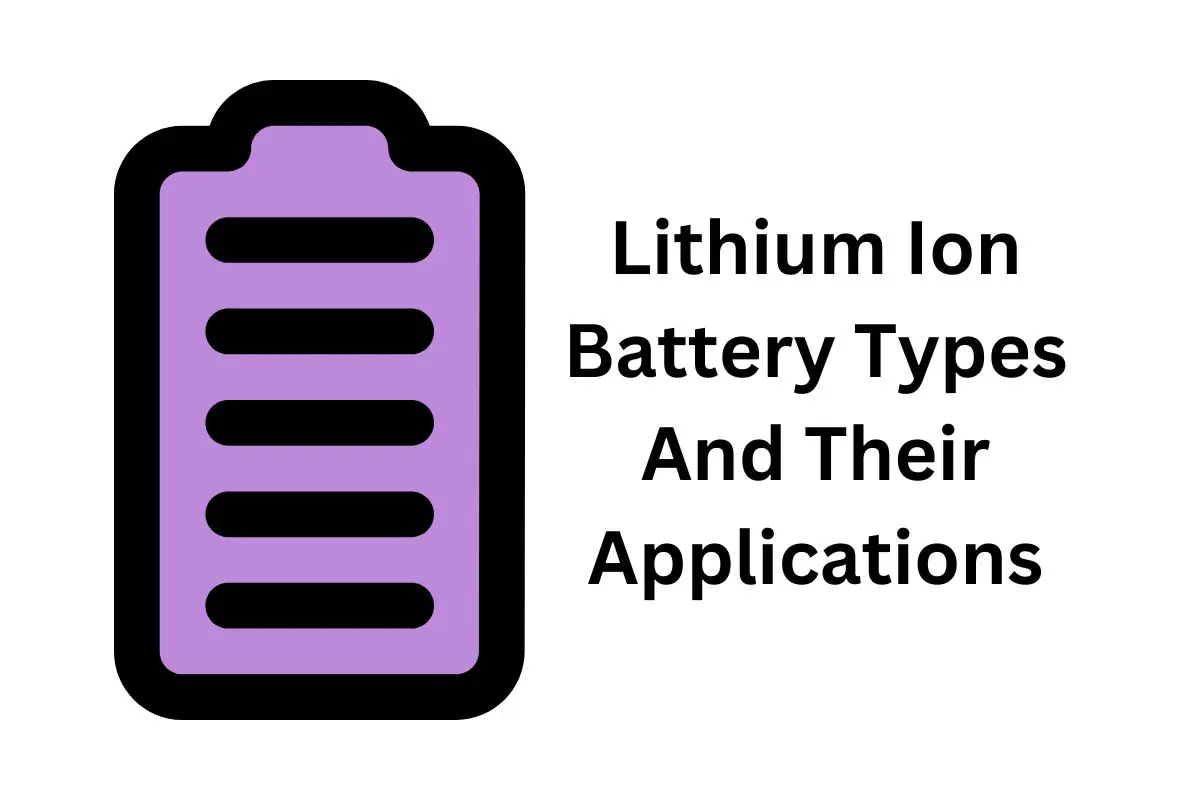Lithium Ion Battery Types And Their Applications Lithium ion batteries have revolutionized the way we power our portable devices, electric vehicles, and even store renewable energy. Understanding the different types of lithium ion batteries and their applications is crucial in a world increasingly reliant on energy storage solutions.
This article delves into the fundamentals of lithium ion batteries, explores the various types available in the market, and examines their diverse applications across industries. By examining the advantages, limitations, and emerging trends in lithium ion battery technology, we can gain a comprehensive insight into this pivotal energy storage system.
Introduction to Lithium Ion Battery Types And Their Applications
Lithium Ion Battery Types And Their Applications Lithium ion batteries are like the superheroes of the battery world – they’re lightweight, rechargeable, and pack a powerful punch. They work by shuttling lithium ions between the positive and negative electrodes, creating the flow of electrical energy that powers our devices.
Types of Lithium Ion Batteries
Lithium Ion Battery Types And Their Applications When it comes to lithium ion batteries, it’s like choosing your favorite flavor of ice cream – there are different types to suit different needs.
Lithium Cobalt Oxide (LCO) Batteries
LCO batteries are like the speed demons of the lithium ion world – they offer high energy density, making them perfect for power-hungry devices like smartphones.
Lithium Iron Phosphate (LFP) Batteries
LFP batteries are the reliable workhorses – they have a longer lifespan and are more stable, making them a popular choice for electric vehicles.
Lithium Nickel Manganese Cobalt Oxide (NMC) Batteries
NMC batteries are the all-rounders – they strike a balance between energy density, lifespan, and cost, making them versatile for various applications.
Applications of Lithium Ion Batteries in Consumer Electronics

Lithium Ion Battery Types And Their Applications Our beloved gadgets wouldn’t be the same without lithium ion batteries powering them up.
Smartphones and Tablets
From scrolling through memes to binge-watching cat videos, lithium ion batteries keep our smartphones and tablets running all day long.
Laptops and Notebooks
Whether you’re crunching numbers for work or streaming your favorite shows, lithium ion batteries give laptops the juice they need to keep you going.
Lithium Ion Batteries in Electric Vehicles
Lithium Ion Battery Types And Their Applications Electric vehicles are driving us towards a greener future, and lithium ion batteries are in the driver’s seat.
Battery Pack Design in Electric Vehicles
Lithium Ion Battery Types And Their Applications Creating the perfect balance between energy capacity, weight, and safety, lithium ion batteries are the heart of the battery packs in electric vehicles.
Charging Infrastructure for Electric Vehicles
Juicing up electric vehicles is made easier with the growing network of charging stations, powered by—you guessed it—lithium ion batteries.
So, the next time you’re powering up your device or cruising in an electric vehicle, remember the unsung hero behind it all – the mighty lithium ion battery! 🦸♂️🔋# Lithium Ion Batteries in Renewable Energy Storage
Integration of Lithium Ion Batteries in Solar Systems
Lithium Ion Battery Types And Their Applications Ever wonder how the sun keeps shining even when it’s dark out? Well, with the help of lithium ion batteries, solar energy can be stored and used even when the clouds roll in. These batteries play a crucial role in solar systems by storing the energy generated during sunny days for use at night or during cloudy conditions.
Grid Stabilization with Lithium Ion Batteries
Lithium Ion Battery Types And Their Applications Grid stabilization might sound like a balancing act at the circus, but it’s actually a vital function in managing our power supply. Lithium ion batteries help stabilize the grid by storing excess energy when supply exceeds demand and releasing stored energy when demand surpasses supply. It’s like having a backup dancer ready to step in and keep the show going smoothly.
Advantages and Limitations of Different Lithium Ion Battery Types
Energy Density and Performance Characteristics
Lithium Ion Battery Types And Their Applications Not all lithium ion batteries are created equal. Some pack a punch with high energy density and excellent performance, while others may fall short. Choosing the right type of battery is crucial for maximizing efficiency and reliability in various applications. It’s like selecting the right tool for the job – you wouldn’t use a spoon to dig a hole!
Cost Considerations and Environmental Impact
Lithium Ion Battery Types And Their Applications Let’s talk money and Mother Nature. The cost and environmental impact of lithium ion batteries are important factors to consider when weighing the pros and cons. Balancing performance with affordability and sustainability is key in making informed decisions. After all, nobody wants to break the bank or harm the planet in the process.
Emerging Trends in Lithium Ion Battery Technology
Solid-State Lithium Ion Batteries
Lithium Ion Battery Types And Their Applications Who said batteries have to be liquid to be cool? Solid-state lithium ion batteries are shaking things up with their safer design and potential for higher energy density. These batteries could revolutionize the way we power our devices and vehicles in the future. It’s like swapping your old flip phone for the latest smartphone – sleek, safe, and powerful.
Advanced Safety Features and Battery Management Systems
Lithium Ion Battery Types And Their Applications Safety first, folks! Advanced safety features and battery management systems are taking lithium ion batteries to the next level in terms of reliability and peace of mind. From temperature regulation to smart monitoring, these technologies ensure that your batteries stay cool, literally and figuratively. Because a battery mishap is never a fun surprise.
In conclusion, the versatility and efficiency of lithium ion batteries continue to shape the landscape of energy storage and power applications. As advancements in technology propel the development of new battery types and enhance existing capabilities, the potential for further innovation in this field is immense. By staying informed about the latest trends and applications of lithium ion batteries, we can contribute to a sustainable and energy-efficient future.
FAQs
Are all lithium-ion batteries the same, or do they vary in terms of performance and applications?
Not all lithium-ion batteries are the same; they vary significantly in terms of performance, chemistry, and applications. Lithium-ion batteries can be customized with different electrode materials, electrolytes, and designs to meet specific performance requirements for various applications. For example, lithium-ion batteries used in consumer electronics prioritize energy density and cycle life, while those used in electric vehicles prioritize power output and longevity. Additionally, specialized lithium-ion batteries may be designed for high-temperature environments, fast charging, or deep discharge cycles, further expanding their range of applications.
How long do lithium-ion batteries typically last, and what factors can impact their lifespan?
The lifespan of lithium-ion batteries can vary depending on several factors, including usage patterns, charging and discharging rates, operating temperature, and manufacturing quality. Generally, lithium-ion batteries can last for several years under normal usage conditions, with degradation occurring gradually over time. However, factors such as overcharging, deep discharges, exposure to extreme temperatures, and physical damage can accelerate degradation and reduce battery lifespan. Proper maintenance, such as avoiding full discharges and keeping batteries within recommended temperature ranges, can help prolong their lifespan.
What are some of the key challenges facing the widespread adoption of lithium-ion batteries in various industries?
Despite their numerous advantages, lithium-ion batteries face several challenges that hinder their widespread adoption in various industries. These challenges include concerns over safety and thermal management, especially in high-energy applications like electric vehicles; limited availability and fluctuating prices of raw materials such as lithium and cobalt; recycling and disposal issues related to battery waste; and the need for continued research and development to improve energy density, cycle life, and environmental sustainability. Addressing these challenges requires collaboration among industry stakeholders, policymakers, and researchers to ensure the continued advancement and responsible deployment of lithium-ion battery technology.

